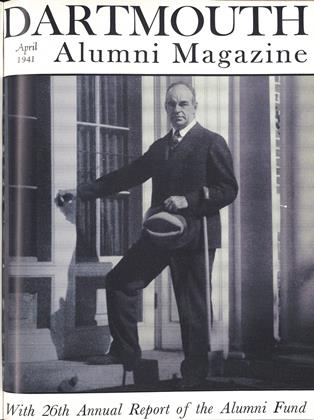MRS. ELIZABETH CAMPBELL GEARY, who fed, mothered and scolded hundreds of Dartmouth boys for twenty-two years, died February 18 at the Fanny Allen Flospital in Winooski, Vermont, where she had been a patient for many months. Funeral services were held February 21st in St. Stephen's Church, Winooski, and burial was in St. Joseph's Cemetery in Winooski. Mrs. Mary Smalley, Richard Smalley and Katherine Cooper of Hanover attended the funeral. Philip Fitzpatrick '29 represented Mrs. Geary's "old boys."
Mrs. Geary was the widow of the late John H. Geary. She was born in Northern New York, the daughter of Daniel and Mary (Lewis) Campbell. She is survived by her daughter Mrs. Jerome V. Mulligan and granddaughter Mary Elizabeth Mulligan, of New York City, and by one brother and two sisters.
Mrs. Geary, with Mrs. Rood and Mrs. Smalley, formed the triumvirate which, in the days before Thayer and Stell Halls, fed generations of Dartmouth students and became a part of the College tradition. In 1914 Jim Haggerty, who had been feeding students for twenty-five years, urged Mrs. Geary to start an eating club. That fall she opened her club in the house on North Main Street now owned by the Clark School. In 1916 she purchased the house on School Street which she owned at the time of her death. From the beginning, her club members were almost entirely Sigma Chis, with a sprinkling of Phi Psis. Mrs. Geary always proudly maintained thai the Sigma Chis were "her boys." They made her an honorary member of the fraternity, presented her with a pin, and even tried to teach her the grip.
From 1915 to 1936 Mrs. Geary served as the house mother at every Sigma Chi Carnival and house party. With her snow-white hair, twinkling eyes, and keen sense of humor, she was the very epitome of what a house mother should be—but, "her boys" knew she was no person to be trifled with! The Sigma Chi program one year carried this note—"Call on Mrs. Geary, our house mother; she will be glad to do anything she can. We want you to know her, because she is a good friend of ours and knows 'most everything about running a successful house party."
Mrs. Geary's old boys never forgot her. Each Christmas she received remembrances from them, and one sent her a corsage, each year, for Easter. Many of her boys, returning to Hanover with their wives, rather than staying at the Inn, went as a matter of course to Mrs. Geary's home.
We wonder—perhaps Mrs. Geary and Mrs. Rood, even now, are talking over "their boys."
 View Full Issue
View Full Issue
More From This Issue
-
 Feature
FeatureReport of Twenty-Sixth Alumni Fund
April 1941 By SUMNER B. EMERSON '17 -
 Feature
FeatureContributions by Classes in 1940 Alumni Fund Campaign
April 1941 -
 Feature
FeatureThayer School Report
April 1941 By F. H. Munkelt '08 (Thayer '09) -
 Feature
FeatureClass Rankings on 1940 Achievement
April 1941 -
 Feature
FeatureDartmouth Regulars
April 1941 -
 Feature
FeatureAlumni Fund Records 1915 to 1940
April 1941








